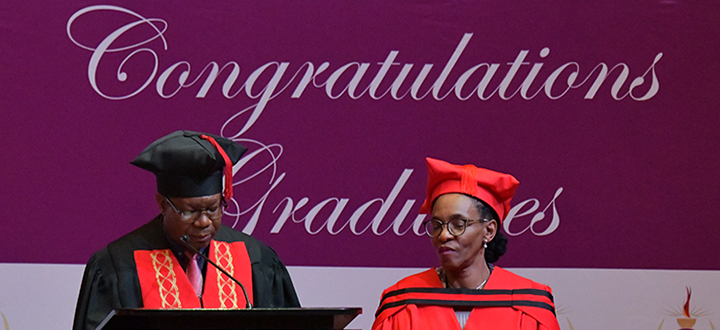College of Human Sciences
Unisa enters into partnership with De La Salle University
From 27 to 31 January 2025, the management of Unisa’s College of Human Sciences (CHS), led by the Deputy Executive Dean, Prof Thinandavha Mashau, visited De La Salle University in Manila, the Philippines, for a strategic partnership initiative as part of Unisa’s internationalisation and commercialisation agenda.

From left: Prof Nokuthula Hlabangane, Head of Academic Quality Assurance and Enhancement, CHS; Prof Siyasanga Tyali, Director: School of Arts, CHS; Prof Shun Fung Chiu, Vice-President for External Relations and Internationalisation, De La Salle University; Prof Azwihangwisi Mavhandu-Mudzusi, Director: School of Social Sciences, CHS; Prof Thinandavha Mashau, Deputy Executive Dean: CHS, and Head of the Unisa delegation; Prof Mokhele Madise, Director: School of Humanities, CHS; Prof Fides Del Castello, Associate Dean: School of Innovation and Sustainability, De La Salle University; Prof Dorothy Martinez, Chair of the Department of Theology and Religious Education; and Dr Nilo Bugtai, Director: EDA-Institute of Biomedical Engineering and Health Technology, De La Salle University.
De La Salle University, with campuses in Manila and Laguna, is a leading university in the Philippines, renowned for its academic excellence, groundbreaking research, and teaching and learning from a challenge-based approach using a hybrid model. It has continued to improve its rankings globally.
"Propelled by the development agenda and the need to unshackle themselves from their colonial past, their model and approach remind us of the imperative for education to be responsive to the felt needs of our communities, as well as empower our students not only for employability, but also to acquire critical skills to help them become entrepreneurs and job creators," commented Mashau. "This fits the bill of being responsive to the National Development Agenda, the UN Sustainable Development Goals, Africa Agenda 2063, and other imperatives that seek to drive the more progressive and humanising development agenda."
During this visit, the CHS management engaged various stakeholders, including senior executive managers and the extended management of De La Salle. They met with two vice-presidents, and various deans and directors from different colleges and schools. Mashau said this South-to-South engagement was testament to the need for the global South to recentre its epistemologies and pedagogies in pursuit of life-affirming, life-giving and transformative education that seeks to decolonise academic offerings. He indicated that the two institutions found common ground in pushing the agenda of promoting their local languages as languages of teaching and learning.
After extensive sharing and exchanging of information about the institutions and their offerings, the following areas were identified for collaboration:
- Teaching, learning, and curriculum transformation
- Research collaboration
- Research projects and funding
- A visiting scholars’ programme
- International conferences, workshops, and webinars on matters of common interest
Mashau continued: "With the kind of research work in which De La Salle is engaged, we also found common interest and convergence in almost all the catalytic niche areas as envisioned by our Principal and Vice-Chancellor (VC), Prof Puleng LenkaBula. CHS is also interested in various programmes around biomedical engineering and health technologies, as this will help the Department of Health Studies to grow beyond nursing and public health and embrace the VC’s vision to introduce medical sciences and a Unisa hospital moving forward. Theology departments at Unisa will also benefit and enrich their discourse around the turnaround strategy on the future of theology in our institution and country. As we continue to digitalise humanities, departments from the School of Arts will also benefit from this initiative as we continue to interface with AI in the context of Homo Digitalis and the fourth industrial revolution where languages, communications and archival information are going digital."
At the end their engagement with the Dean of Liberal Arts, Dr Ador Torneo, Mashau concluded that the partnership can easily be extended beyond social sciences and humanities to Unisa’s other colleges, hence the need for Unisa and De La Salle to sign an institutional memorandum of understanding for further engagements and collaboration. The initiative will also go a long way towards assisting both institutions to improve on their global rankings.
* By Khabonina Maduna, Communication and Marketing Specialist, College of Human Sciences
Publish date: 2025/02/13

 Unisa co-hosts G20 community outreach in the Eastern Cape
Unisa co-hosts G20 community outreach in the Eastern Cape
 Unisans gain membership of prestigious science academies
Unisans gain membership of prestigious science academies
 Advocating for disability transformation through servant leadership
Advocating for disability transformation through servant leadership
 Unisa Press continues to illuminate the publishing space
Unisa Press continues to illuminate the publishing space